The U.S. Embassy Literature Series – Celebrating Women’s History Month
A reading and discussion with Heidi Julavits, moderated by Anna Winger
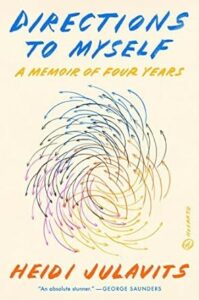 Directions to Myself, a memoir of locating where you are – so you know where you’re going. One day Heidi Julavits sees her son silhouetted by the sun and notices he is at the threshold of what she calls “the end times of childhood.” Who is my son becoming, she asks herself – and what qualifies me to be his guide? The next four years feel like uncharted waters. Rape allegations rock the university campus where Julavits teaches, unleashing questions of justice and accountability, education and prevention. Julavits begins to wonder how to prepare her son to be the best possible citizen of the world he’s about to enter. And what she must learn about herself to responsibly steer him. Using the past and present as points of orientation, Directions to Myself examines the minutiae of family life alongside knottier questions of politics and gender. Through it all, Julavits discovers the beauty and the peril of telling stories as a way to locate ourselves and help others find us.
Directions to Myself, a memoir of locating where you are – so you know where you’re going. One day Heidi Julavits sees her son silhouetted by the sun and notices he is at the threshold of what she calls “the end times of childhood.” Who is my son becoming, she asks herself – and what qualifies me to be his guide? The next four years feel like uncharted waters. Rape allegations rock the university campus where Julavits teaches, unleashing questions of justice and accountability, education and prevention. Julavits begins to wonder how to prepare her son to be the best possible citizen of the world he’s about to enter. And what she must learn about herself to responsibly steer him. Using the past and present as points of orientation, Directions to Myself examines the minutiae of family life alongside knottier questions of politics and gender. Through it all, Julavits discovers the beauty and the peril of telling stories as a way to locate ourselves and help others find us.
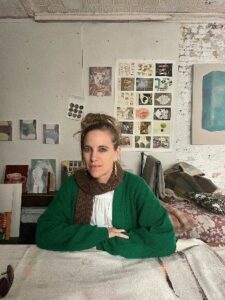 Heidi Julavits is an associate professor at Columbia University’s School of the Arts. She received her BA from Dartmouth College and MFA from Columbia University. Julavits is the author, most recently, of Directions to Myself (Hogarth, 2023), and The Folded Clock: A Diary (Doubleday, 2015), a New York Times Notable Book. She is also the author of four novels, including The Vanishers (Doubleday, 2012), winner of the PEN New England Fiction Award, and The Mineral Palace (Putnam, 2000), her first novel and a finalist for the Young Lions Literary Award. She is co-editor, with Sheila Heti and Leanne Shapton, of the bestselling Women in Clothes (Blue Rider 2014). Julavits’s short fiction and essays have appeared in the New Yorker, New York Times Magazine, Harper’s, McSweeney’s, and New York Magazine, among others, and have been anthologized in Best American Short Stories and Best American Travel Essays. Recipient of a 2007 Guggenheim fellowship, Julavits is a founding editor of The Believer magazine. Heidi Julavits is a Spring 2024 Fellow at the American Academy in Berlin.
Heidi Julavits is an associate professor at Columbia University’s School of the Arts. She received her BA from Dartmouth College and MFA from Columbia University. Julavits is the author, most recently, of Directions to Myself (Hogarth, 2023), and The Folded Clock: A Diary (Doubleday, 2015), a New York Times Notable Book. She is also the author of four novels, including The Vanishers (Doubleday, 2012), winner of the PEN New England Fiction Award, and The Mineral Palace (Putnam, 2000), her first novel and a finalist for the Young Lions Literary Award. She is co-editor, with Sheila Heti and Leanne Shapton, of the bestselling Women in Clothes (Blue Rider 2014). Julavits’s short fiction and essays have appeared in the New Yorker, New York Times Magazine, Harper’s, McSweeney’s, and New York Magazine, among others, and have been anthologized in Best American Short Stories and Best American Travel Essays. Recipient of a 2007 Guggenheim fellowship, Julavits is a founding editor of The Believer magazine. Heidi Julavits is a Spring 2024 Fellow at the American Academy in Berlin.
 Anna Winger is a writer, producer and creator of such television series as Deutschland83 (Amazon), Unorthodox (Netflix) and Transatlantic (Netflix). She is also the author of a novel, This Must Be the Place (Riverhead), a radio series for NPR Worldwide called Berlin Stories, and personal essays that have appeared in the New York Times Magazine, the Frankfurter Allgemeine Zeitung, and the Süddeutsche Zeitung. American and British, she was raised in Kenya, Massachusetts and Mexico. She studied at Columbia, worked for many years as a photographer, and finally settled in Berlin, where she lives with her family. She has received Emmy, Peabody and Adolf Grimme awards for her work.
Anna Winger is a writer, producer and creator of such television series as Deutschland83 (Amazon), Unorthodox (Netflix) and Transatlantic (Netflix). She is also the author of a novel, This Must Be the Place (Riverhead), a radio series for NPR Worldwide called Berlin Stories, and personal essays that have appeared in the New York Times Magazine, the Frankfurter Allgemeine Zeitung, and the Süddeutsche Zeitung. American and British, she was raised in Kenya, Massachusetts and Mexico. She studied at Columbia, worked for many years as a photographer, and finally settled in Berlin, where she lives with her family. She has received Emmy, Peabody and Adolf Grimme awards for her work.
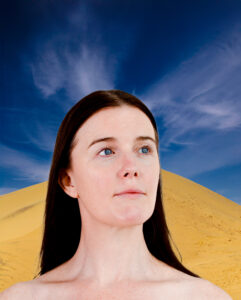 Under a mute sky of blazing light; Winnie, sunk to her waist in a mound of sand, and her husband Willie, mostly immobile in a cave behind her, attempt to cope with their doomed situation.
Under a mute sky of blazing light; Winnie, sunk to her waist in a mound of sand, and her husband Willie, mostly immobile in a cave behind her, attempt to cope with their doomed situation.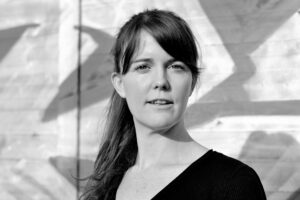 The role of Winnie is played by Berlin-based Irish actor Mary Kelly. Mary has performed extensively in Ireland, including at the Gate Theatre, and in Germany most regularly at English Theatre Berlin | International Performing Arts Center.
The role of Winnie is played by Berlin-based Irish actor Mary Kelly. Mary has performed extensively in Ireland, including at the Gate Theatre, and in Germany most regularly at English Theatre Berlin | International Performing Arts Center.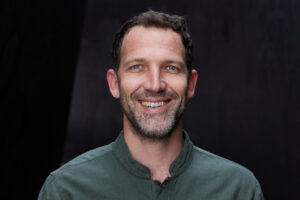 The role of Willie is played by Tomas Spencer, who began his career at ETB | IPAC in the early 2000s and has gone on to appear in numerous films and television programs, including The Last Station, Nymphomaniac and Passport To Freedom.
The role of Willie is played by Tomas Spencer, who began his career at ETB | IPAC in the early 2000s and has gone on to appear in numerous films and television programs, including The Last Station, Nymphomaniac and Passport To Freedom.